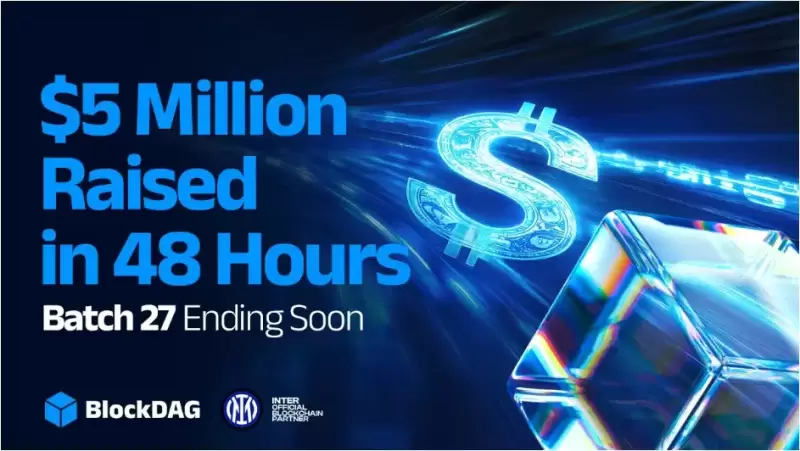 |
|
 |
|
 |
|
 |
|
 |
|
 |
|
 |
|
 |
|
 |
|
 |
|
 |
|
 |
|
 |
|
 |
|
 |
|
为了确保选举过程的透明度和安全性,罗马尼亚将采取前所未有的举措,为即将于 11 月 24 日举行的总统选举实施区块链技术。

In an unprecedented move to ensure transparency and security in electoral processes, Romania is set to implement blockchain technology for the upcoming presidential elections on November 24. The groundbreaking initiative is spearheaded by the Permanent Electoral Authority (Autoritatea Electorală Permanentă), marking a significant shift in the way votes are counted and validated in the country.
为了确保选举过程的透明度和安全性,罗马尼亚将采取前所未有的举措,为即将于 11 月 24 日举行的总统选举实施区块链技术。这一突破性举措由常设选举机构 (Autoritatea Electorală Permanentă) 牵头,标志着选举过程中的重大转变。该国计票和验证选票的方式。
Romania's decision to adopt blockchain technology is a bold step towards enhancing the integrity of electoral outcomes. By employing this cutting-edge technology, the country aims to secure the voting process against tampering and fraud, providing a verifiable and transparent record of every vote cast. This approach signals a transformation in public confidence in electoral systems, setting a potential example for other nations.
罗马尼亚决定采用区块链技术是提高选举结果完整性的大胆一步。通过采用这种尖端技术,该国旨在确保投票过程免遭篡改和欺诈,为每一次投票提供可验证和透明的记录。这种做法标志着公众对选举制度信心的转变,为其他国家树立了潜在的榜样。
Known for its robust security features, such as decentralization and encryption that prevent unauthorized modifications, blockchain technology is being harnessed to resolve longstanding electoral challenges. The implementation in Romania's presidential election underscores the importance of adopting modern solutions. This move is expected to not only improve vote accuracy but also boost trust in democratic processes among citizens.
区块链技术以其强大的安全功能(例如防止未经授权的修改的去中心化和加密)而闻名,正被用来解决长期存在的选举挑战。罗马尼亚总统选举的实施凸显了采用现代解决方案的重要性。此举预计不仅会提高投票准确性,还会增强公民对民主进程的信任。
As Romania pioneers this technology in national elections, the potential ripple effects for global electoral practices are significant. Observers worldwide are keenly watching Romania's success, which could catalyze a broader application of blockchain in elections across different countries. This technological advancement represents a promising future for electoral integrity on a global scale.
随着罗马尼亚在全国选举中率先采用这项技术,全球选举实践的潜在连锁反应是巨大的。世界各地的观察家都在密切关注罗马尼亚的成功,这可能会促进区块链在不同国家选举中的更广泛应用。这一技术进步代表了全球范围内选举诚信的光明前景。
***
***
As Romania ventures into the uncharted territory of blockchain-based voting for its upcoming elections, this pioneering effort raises compelling questions about the future of democracy in the digital age. While the nation is taking a bold leap to enhance the transparency and security of its electoral system, it's crucial to explore the broader implications of this technological evolution on societies globally.
随着罗马尼亚为即将举行的选举进入基于区块链的投票的未知领域,这一开创性的努力引发了有关数字时代民主未来的引人注目的问题。虽然国家正在采取大胆的举措来提高选举制度的透明度和安全性,但探索这一技术演变对全球社会的更广泛影响至关重要。
Blockchain technology could fundamentally reshape how elections are conducted worldwide. With its decentralized and immutable nature, blockchain can ensure that each vote is tamper-proof and independently verifiable. This not only mitigates the risk of fraud but also exemplifies a transparent voting process that can engender greater trust among citizens. For countries that have struggled with electoral fraud and manipulation, blockchain presents a lifeline for restoring faith in democratic processes.
区块链技术可以从根本上重塑全球选举的进行方式。区块链凭借其去中心化和不可篡改的特性,可以确保每一次投票都是防篡改且可独立验证的。这不仅降低了欺诈风险,而且体现了透明的投票过程,可以在公民之间产生更大的信任。对于那些一直在与选举舞弊和操纵作斗争的国家来说,区块链为恢复对民主进程的信心提供了一条生命线。
However, this advancement is not without its challenges. One significant concern is the digital divide. How can countries ensure equitable access to blockchain-based voting systems for all citizens, especially in places where technological infrastructure is lacking? The success of this technology is heavily dependent on the ability to bridge this gap, ensuring that every voter can participate in a digitally-driven electoral process.
然而,这一进步并非没有挑战。数字鸿沟是一个值得关注的问题。各国如何确保所有公民公平地使用基于区块链的投票系统,特别是在缺乏技术基础设施的地方?这项技术的成功在很大程度上取决于弥合这一差距的能力,确保每个选民都能参与数字驱动的选举过程。
Did you know that blockchain's applications extend far beyond cryptocurrency? The technology is being explored for use in areas like supply chain management, healthcare, and, as we now see, elections. Yet, the controversy surrounding its use in voting stems from both technological and ethical concerns. Critics argue about the potential for “51% attacks” where if over half of the network's computers are controlled by a single entity, they could alter the blockchain's records. Although this is theoretically implausible for large blockchain networks, the concern remains for smaller-scale deployments such as those in limited voter populations.
您知道区块链的应用远远超出了加密货币吗?该技术正在探索用于供应链管理、医疗保健以及我们现在看到的选举等领域。然而,围绕其在投票中使用的争议源于技术和道德方面的担忧。批评者认为存在“51% 攻击”的可能性,即如果超过一半的网络计算机由单个实体控制,他们就可以更改区块链的记录。尽管这对于大型区块链网络来说在理论上是难以置信的,但对于较小规模的部署(例如在有限选民群体中的部署)仍然存在担忧。
Moreover, blockchain's implementation in elections may face legal and regulatory hurdles. Different countries have varying standards for electoral processes, and integrating blockchain smoothly into these systems requires navigating complex legal frameworks and ensuring compliance with existing electoral laws.
此外,区块链在选举中的实施可能面临法律和监管障碍。不同国家的选举程序有不同的标准,将区块链顺利集成到这些系统中需要浏览复杂的法律框架并确保遵守现有的选举法。
One of the most significant benefits of blockchain in elections is the enhancement of vote security. Since each transaction (vote) on a blockchain is encrypted and linked to the previous one, the process becomes exceptionally secure. Additionally, the transparency of blockchain could potentially reduce the cost of election monitoring and audits, as the technology itself acts as a credential validator.
区块链在选举中最显着的好处之一是增强投票安全性。由于区块链上的每笔交易(投票)都经过加密并链接到前一笔交易,因此该过程变得异常安全。此外,区块链的透明度可能会降低选举监控和审计的成本,因为该技术本身充当凭证验证器。
On the flip side, a considerable disadvantage is the cost and effort of initial implementation. Countries must invest in necessary technological infrastructure and train election officials and the public on how to navigate a blockchain-based voting system. Concerns about voter privacy also arise, as traceable transactions may inadvertently expose voter identities unless carefully managed.
另一方面,一个相当大的缺点是初始实施的成本和精力。各国必须投资必要的技术基础设施,并培训选举官员和公众如何使用基于区块链的投票系统。对选民隐私的担忧也随之出现,因为除非精心管理,否则可追踪交易可能会无意中暴露选民身份。
As countries like Romania lead the way in blockchain electoral processes, it could inspire a wave of technological adoptions that modernize voting systems worldwide. The real test will be whether these systems can demonstrate not just security, but also accessibility and reliability in diverse electoral landscapes.
随着罗马尼亚等国家在区块链选举过程中处于领先地位,它可能会激发一波技术采用浪潮,使全球投票系统现代化。真正的考验将是这些系统是否不仅能够证明安全性,而且能够在不同的选举环境中证明可访问性和可靠性。
免责声明:info@kdj.com
所提供的信息并非交易建议。根据本文提供的信息进行的任何投资,kdj.com不承担任何责任。加密货币具有高波动性,强烈建议您深入研究后,谨慎投资!
如您认为本网站上使用的内容侵犯了您的版权,请立即联系我们(info@kdj.com),我们将及时删除。
-

- 瓜达钱包评论:最好的比特币钱包和总体最好的加密钱包
- 2025-04-03 13:35:13
- 如果您想变得环保,您需要做很多事情。如果您使用加密货币,这将变得更加困难。
-

- 与大多数XRP持有人不同
- 2025-04-03 13:35:13
- PALADININGING CLOUD采矿服务提供商在人群中脱颖而出,成为XRP投资者的最佳选择。
-

- 加密交易所Kraken已在加拿大注册为受限制的经销商
- 2025-04-03 13:30:12
- 该注册于周二宣布,是在需要交流的多年过程之后,以符合更高的投资者保护和治理标准。
-

- 3个加密货币爆炸,因为比特币保持强大,而山寨币则显示出野生秋千
- 2025-04-03 13:30:12
- 加密价格最近在各地都在弹跳,但是一件事很明显 - 要努力追捕稳固的项目,这是一件很明显的钱
-

- 加密货币刚打电话。
- 2025-04-03 13:25:12
- BlockDag的第三个主题演讲不仅丢弃更新,还触发了资金。在仅48小时内,超过500万美元涌入,该项目的预售总计超过2.1亿美元。
-

- BlockDag(BDAG)在2025年的加密货币市场上占主导地位
- 2025-04-03 13:25:12
- 加密货币领域在2025年正在迅速发展,投资者积极寻求下一个可以带来巨大回报的大加密货币。
-

-

- 比特币(BTC)价格下跌,特朗普总统的新关税摇滚加密资产
- 2025-04-03 13:20:12
- 随着特朗普总统的新关税摇滚全球市场,加密资产目睹了新的清算浪潮。
-





























































